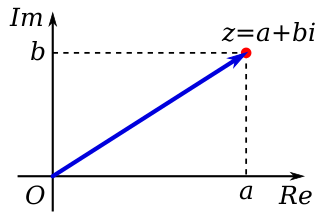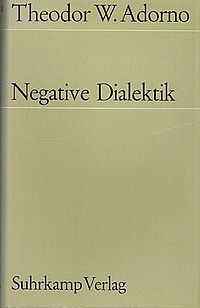
In mathematics, a complex number is an element of a number system that extends the real numbers with a specific element denoted i, called the imaginary unit and satisfying the equation ; every complex number can be expressed in the form , where a and b are real numbers. Because no real number satisfies the above equation, i was called an imaginary number by René Descartes. For the complex number ,a is called the real part, and b is called the imaginary part. The set of complex numbers is denoted by either of the symbols or C. Despite the historical nomenclature, "imaginary" complex numbers have a mathematical existence as firm as that of the real numbers, and they are fundamental tools in the scientific description of the natural world.

Feedback occurs when outputs of a system are routed back as inputs as part of a chain of cause-and-effect that forms a circuit or loop. The system can then be said to feed back into itself. The notion of cause-and-effect has to be handled carefully when applied to feedback systems:
Simple causal reasoning about a feedback system is difficult because the first system influences the second and second system influences the first, leading to a circular argument. This makes reasoning based upon cause and effect tricky, and it is necessary to analyze the system as a whole. As provided by Webster, feedback in business is the transmission of evaluative or corrective information about an action, event, or process to the original or controlling source.

An integer is the number zero (0), a positive natural number or a negative integer. The negative numbers are the additive inverses of the corresponding positive numbers. The set of all integers is often denoted by the boldface Z or blackboard bold .

A number is a mathematical object used to count, measure, and label. The most basic examples are the natural numbers 1, 2, 3, 4, and so forth. Numbers can be represented in language with number words. More universally, individual numbers can be represented by symbols, called numerals; for example, "5" is a numeral that represents the number five. As only a relatively small number of symbols can be memorized, basic numerals are commonly organized in a numeral system, which is an organized way to represent any number. The most common numeral system is the Hindu–Arabic numeral system, which allows for the representation of any non-negative integer using a combination of ten fundamental numeric symbols, called digits. In addition to their use in counting and measuring, numerals are often used for labels, for ordering, and for codes. In common usage, a numeral is not clearly distinguished from the number that it represents.

In economics, an externality or external cost is an indirect cost or benefit to an uninvolved third party that arises as an effect of another party's activity. Externalities can be considered as unpriced goods involved in either consumer or producer market transactions. Air pollution from motor vehicles is one example. The cost of air pollution to society is not paid by either the producers or users of motorized transport to the rest of society. Water pollution from mills and factories is another example. All consumers are made worse off by pollution but are not compensated by the market for this damage. A positive externality is when an individual's consumption in a market increases the well-being of others, but the individual does not charge the third party for the benefit. The third party is essentially getting a free product. An example of this might be the apartment above a bakery receiving the benefit of enjoyment from smelling fresh pastries every morning. The people who live in the apartment do not compensate the bakery for this benefit.

In mathematics, exponentiation is an operation involving two numbers: the base and the exponent or power. Exponentiation is written as bn, where b is the base and n is the power; this is pronounced as "b (raised) to the n". When n is a positive integer, exponentiation corresponds to repeated multiplication of the base: that is, bn is the product of multiplying n bases:

In mathematics, a negative number represents an opposite. In the real number system, a negative number is a number that is less than zero. Negative numbers are often used to represent the magnitude of a loss or deficiency. A debt that is owed may be thought of as a negative asset. If a quantity, such as the charge on an electron, may have either of two opposite senses, then one may choose to distinguish between those senses—perhaps arbitrarily—as positive and negative. Negative numbers are used to describe values on a scale that goes below zero, such as the Celsius and Fahrenheit scales for temperature. The laws of arithmetic for negative numbers ensure that the common-sense idea of an opposite is reflected in arithmetic. For example, − (−3) = 3 because the opposite of an opposite is the original value.

Cherry picking, suppressing evidence, or the fallacy of incomplete evidence is the act of pointing to individual cases or data that seem to confirm a particular position while ignoring a significant portion of related and similar cases or data that may contradict that position. Cherry picking may be committed intentionally or unintentionally.
Positive liberty is the possession of the power and resources to act in the context of the structural limitations of the broader society which impacts a person's ability to act, as opposed to negative liberty, which is freedom from external restraint on one's actions.

Negative liberty is freedom from interference by other people. Negative liberty is primarily concerned with freedom from external restraint and contrasts with positive liberty. The distinction originated with Bentham, was popularized by T. H. Green and Guido De Ruggiero, and is now best known through Isaiah Berlin's 1958 lecture "Two Concepts of Liberty".

Russell's teapot is an analogy, formulated by the philosopher Bertrand Russell (1872–1970), to illustrate that the philosophic burden of proof lies upon a person making empirically unfalsifiable claims, as opposed to shifting the burden of disproof to others.
Real freedom is a term coined by the political philosopher and economist Philippe Van Parijs. It expands upon notions of negative freedom by incorporating not simply institutional or other constraints on a person's choices, but also the requirements of physical reality, resources and personal capacity. To have real freedom, according to Van Parijs, an individual must:

Negative Dialectics is a 1966 book by the philosopher Theodor W. Adorno.

In mathematics, the sign of a real number is its property of being either positive, negative, or 0.
Funnies are terms used during a game of golf to describe various achievements, both positive and negative. They are different from traditional expressions such a birdie, eagle, etc. in that they do not necessarily refer to strict scores, but to unusual events which may happen in the course of a game. They are constantly being developed and there is some variation in their interpretation and usage throughout the world.
An ontological argument is a philosophical argument, made from an ontological basis, that is advanced in support of the existence of God. Such arguments tend to refer to the state of being or existing. More specifically, ontological arguments are commonly conceived a priori in regard to the organization of the universe, whereby, if such organizational structure is true, God must exist.

What Should Legal Analysis Become? is a book by philosopher and politician Roberto Mangabeira Unger. First published in 1996, the book germinated from lectures Unger gave at Yale Law School, Columbia Law School, and the London School of Economics. In the book, Unger argues that in order to transform society to be more radically democratic, it is necessary to penetrate the specialized professions so that we can talk about, and imagine, institutions effectively. Unger focuses on the legal profession in this book, setting forth a vision of law as "institutional imagination." He presents a program for changing the nature of the legal profession so that less power is vested in legal professionals and institutions, and legal analysis is reoriented to be more egalitarian and advance more effectively the democratic project.
Negative utilitarianism is a form of negative consequentialism that can be described as the view that people should minimize the total amount of aggregate suffering, or that they should minimize suffering and then, secondarily, maximize the total amount of happiness. It can be considered as a version of utilitarianism that gives greater priority to reducing suffering than to increasing pleasure. This differs from classical utilitarianism, which does not claim that reducing suffering is intrinsically more important than increasing happiness. Both versions of utilitarianism hold that morally right and morally wrong actions depend solely on the consequences for overall aggregate well-being. "Well-being" refers to the state of the individual.
This is a glossary of policy debate terms.












